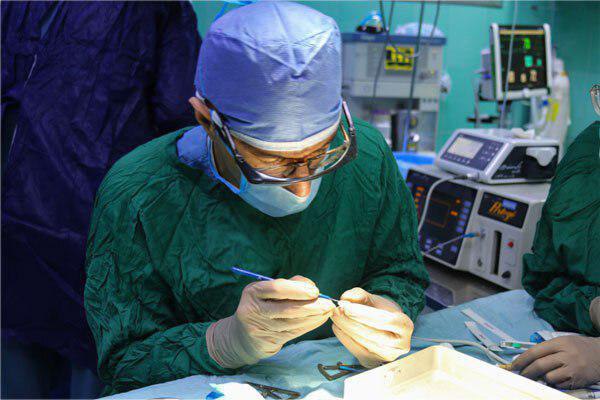The advanced surgery was carried out by Dr Mehran Zarei Qanawati, a corneal specialist. He says the patient was a 43-year-old woman who developed bilateral corneal opacity and vision loss due to Stevens-Johnson Syndrome which is a rare medicine allergy.
For patients with severe dry eye, normal corneal transplantation is rapidly destroyed and will not work. Even many types of artificial cornea cannot be used in these patients, and the best surgery for these patients is to use OOKP technique, he added.
Regarding the OOKP technique, he said the artificial corneal transplantation using dental tissue is an advanced therapy for the treatment of blindness that is offered in about 10 ophthalmology centres around the world.
“Fortunately, we will see this surgery being performed at Farabi Hospital as the only provider of this service in Iran as of now,” he underlined.
According to this specialist, the surgery is done in two stages, the first of which involves removing the tooth with some part of the jawbone. Then a hole with a diameter of 3.5 to 4.5 mm is cut into this layer, and a special optical cylinder is placed into it.
This piece is implanted under the lower eyelid for three months to form a vascular tissue around it.
Also at this stage the patient’s cornea is covered with oral mucosal tissue. In the second step, the cornea and tooth structure around which the connective tissue is grown is removed from the eyelid. Then, by making a cut at the centre of the patient’s cornea, some part of the cylinder is inserted into the eye and the tooth and outer part of the cylinder is placed on the cornea to will act as a corneal prosthesis.
This associate professor of ophthalmology at Tehran University of Medical Sciences said the technique was invented in the early 1980s by Italian ophthalmologist Benedetto Strampelli, but because of its complexity, it is just performed in a limited number of countries.
“One of the most experienced surgeons in OOKP is Professor Christopher Liu, who has worked hard to develop this technique in the world and I was trained by him in the UK.”
The cost of this surgery in the UK is around £ 70,000 but the surgical team did not receive a fee from the Iranian patient.
